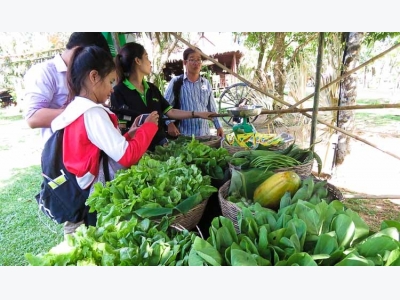Organic farm is first EU standard in Cambodia

Organic vegetables at Picnic Resort. KT/Srey Kumneth
The organic farm at Picnic Resort in Kompong Seila district, Preah Sihanouk province is the first in Cambodia to be certified as meeting European Union standards. The farm supplies about 58 types of organic produce to distributors in Phnom Penh.
Picnic Resort is owned by Khmer Organic Cooperative, which not only grows and supplies organic foods, but also trains farmers, companies, students and other youth in how to plant and grow organic crops, organising training sessions, workshops, and field trip.
Ieng Sotheara, founder of the cooperative, said his dedication to growing organic vegetables grew out of his concern for Cambodians’ health. He committed himself to winning EU certification for his efforts, something his company achieved in cooperation with GIZ Cambodia. (GIZ, or Deutsche Gesellschaft für Internationale Zusammenarbeit, is Germany’s international development agency.)
Mr Sotheara said he became aware of the need to increase public access to healthy food after he “noticed people using chemical fertilisers to grow their fruit and vegetables, which left me worried about public health. This is just one reason that our company tries to plant and grow organic food. We applied for EU standard certification to gain more trust and confidence from our clients and the public.
“We began by educating people about the health benefits of eating organic produce. Over time, more organic farms have appeared in Cambodia, as public awareness has grown about the health benefits,” he said.
Recently at the field trip, Neang Thai, the cooperative’s manager for contract and organic farming, and an expert in the Food and Agriculture Organisation’s Good Agricultural Practices, said it is common nowadays for farmers to claim that their crops are chemical free, but without certification it is difficult to verify.
“That’s why our company wanted to get EU certification for organic food production, so that people in the country would trust us,” he said.
“We have developed techniques to help farmers plant or grow organic vegetables involving soil [monitoring pH levels], water [monitoring humidity and sunshine levels], greenhouse construction [storage conditions, size of individual planting beds], and making fertiliser from manure and bat guano. Care also has to be taken during harvesting of organic crops; you cannot lay the crops down on the soil unprotected, as bacteria can contaminate them,” Mr Thai said.
Pen Sokchan, 20, a second-year student at the Royal University of Agriculture, recently took part in a field trip to the farm to learn more about growing vegetables organically.
She came from a farming family that was eager to learn more about techniques for growing organic vegetables, she said.
She also wanted to know about the selling prices of organic crops, adding that while organic produce was more expensive to buy, she believed it was worth it as the quality was higher.
“I came to learn organic vegetable farming techniques. I will take the skills I learn here and teach them to my parents. I want them to plant organic vegetables for our personal consumption. We don’t plan to grow it for sale in the market, just for our own health, especially with my parents getting older – they need healthy food,” Ms Sokchan said.
Yeun Sreymum, 20, has worked on the farm at Picnic Resort for almost a year, and buys all the vegetables she eats from there. She also planned to grow organic crops at her own house after she had learned a bit more.
“Now that I know how beneficial it is for our health to eat organic vegetables, my family has started eating them every day. My family and I chose to work here rather than become migrant workers, which is really difficult,” Ms Sreymum said.
She added that her work had benefited her in terms of both her health and her income, as she was earning enough to support her family. Although the organic produce is more expensive than conventionally grown crops, the company offered it to workers at a discount.
Có thể bạn quan tâm
 How to Decipher Heat Loss and Greenhouse R-Value
How to Decipher Heat Loss and Greenhouse R-Value Hundreds of new small farmers are entering the industry every year, and greenhouses are one of the easiest ways to get started growing your small farm.
 Wireless sensor network for agricultural communities launched
Wireless sensor network for agricultural communities launched The vision of having license-free community sensor networks for agricultural users has made a giant leap closer to reality.
 Hydroponic farming to be tested in Cambodia
Hydroponic farming to be tested in Cambodia Japanese company Asian Gateway (Cambodia) will soon conduct a pilot project with a hydroponic farm in Cambodia.